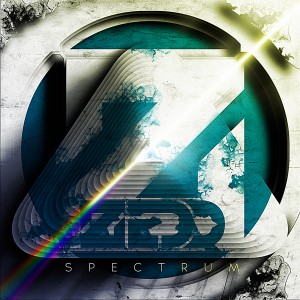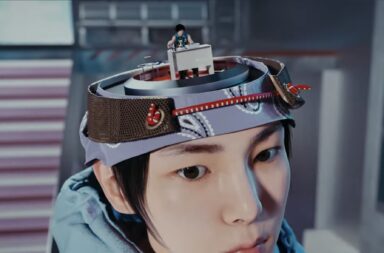 When I discovered that SM Entertainment had debuted a new subgroup in the SBS Gayo called S.M. the Performance, after laughing at SM’s creativity with subgroup names (S.M. the Ballad, anyone?), I actually found myself really impressed by their song “Spectrum”. The heavy electronic dance music (EDM) influence—complete with dubstep breakdowns that actually worked!—was unlike anything I had ever heard in K-pop, and sounded as if it could fit right into the parties my friends DJ. But I should’ve known it was too good to be true.
When I discovered that SM Entertainment had debuted a new subgroup in the SBS Gayo called S.M. the Performance, after laughing at SM’s creativity with subgroup names (S.M. the Ballad, anyone?), I actually found myself really impressed by their song “Spectrum”. The heavy electronic dance music (EDM) influence—complete with dubstep breakdowns that actually worked!—was unlike anything I had ever heard in K-pop, and sounded as if it could fit right into the parties my friends DJ. But I should’ve known it was too good to be true.
It turns out the song is nothing more than a remake of a popular EDM song called “Spectrum” by Zedd. For those of you who don’t know, Zedd is a producer from Germany currently signed with Interscope, and “Spectrum” was his debut single released earlier in 2012, to which SM apparently bought the rights. While I don’t think remaking songs is inherently wrong, I’ve officially reached my limit with SM’s habit thanks to “Spectrum”. Why?
 1) “Spectrum” is a lazy remake. A good remake should involve revamping the original song to fit SM’s artists. SHINee’s “Juliette” heavily built upon the instrumental of Corbin Bleu’s “Deal With It” and added some powerful vocals, while SNSD’s version of “Run Devil Run” has a higher production quality than the Ke$ha demo. Even remakes that use the exact same instrumental as the original can be made new just through great vocals, which is the case for SHINee’s “A-Yo” (originally by Denice Stone).
1) “Spectrum” is a lazy remake. A good remake should involve revamping the original song to fit SM’s artists. SHINee’s “Juliette” heavily built upon the instrumental of Corbin Bleu’s “Deal With It” and added some powerful vocals, while SNSD’s version of “Run Devil Run” has a higher production quality than the Ke$ha demo. Even remakes that use the exact same instrumental as the original can be made new just through great vocals, which is the case for SHINee’s “A-Yo” (originally by Denice Stone).
But nothing was noticeably different about “Spectrum” except for the language and the people singing it. And considering that S.M. the Performance is made up of dancers and there are only four melody lines throughout the entire song, those vocals don’t exactly count for much. Just like how there was nothing that made SNSD’s recently released “Dancing Queen” noteworthy compared to the original song by Duffy, outside of having nine voices instead of one sing the chorus. Remakes like that are nothing more than covers—and not even really good ones—and if this is the standard SM wants to set, I’m not buying it. I’m not about to have my K-pop groups turn into cover bands.
 2) SM’s laziness is becoming obvious. Just like it didn’t take long for netizens to find the original versions of F(x)’s Pinocchio and Hot Summer, it took me about 30 minutes after first hearing “Spectrum” to accidentally stumble upon the Zedd original. Unlike a lot of previous SM remakes that were either demos or songs that never really gained mainstream success, Zedd’s “Spectrum” is actually pretty popular–it was promoted by Lady Gaga, reached Top 40 on the U.S. Pop charts, and #1 on the year-end U.S. Dance charts.
2) SM’s laziness is becoming obvious. Just like it didn’t take long for netizens to find the original versions of F(x)’s Pinocchio and Hot Summer, it took me about 30 minutes after first hearing “Spectrum” to accidentally stumble upon the Zedd original. Unlike a lot of previous SM remakes that were either demos or songs that never really gained mainstream success, Zedd’s “Spectrum” is actually pretty popular–it was promoted by Lady Gaga, reached Top 40 on the U.S. Pop charts, and #1 on the year-end U.S. Dance charts.
On top of that, the Zedd version was only released in June meaning it’s still fresh in people’s memories–some of my friends immediately recognized the song while others knew it sounded familiar. At least “Dancing Queen” wasn’t released until years after “Mercy” was popular, and that still didn’t prevent tons of people from calling SM out for its blatant copying—so just imagine the reactions if it had been released back in 2008, when “Mercy” was at its peak! Stunts like that make it harder for people to take SM and its artists seriously as a professional music label. If you’re going to borrow a song, a least hide it better—copying a Top 40 hit is pretty ballsy even if you did buy the rights to it, especially if you’re not going to bother to make it sound better than the original.
 3) I’m tired of feeling duped. At least with “Dancing Queen” I wasn’t fooled for a second, but I had high hopes for “Spectrum” and so did a lot of others. My friend was excited at the thought of SM going down the EDM path, and I thought SM was really stepping up its game in terms of innovation and quality, things that “Maxstep” didn’t quite achieve. So I wasn’t exactly pleased to discover it was just a cover, just like how I wasn’t all too thrilled earlier this year when I found out the main theme of my favorite EXO teaser was actually just taken from a free online sampler package, which takes about as much creativity as opening up Garage Band and picking out one of its preset music samples. Nor did I appreciate the surprise I got while writing this article when I discovered a lot (not just one or two like I previously thought) of songs on Lucifer, one of my favorite K-pop albums, are remakes as well. I just don’t like feeling impressed by changes in SM’s sound only to discover that they aren’t SM’s sound at all.
3) I’m tired of feeling duped. At least with “Dancing Queen” I wasn’t fooled for a second, but I had high hopes for “Spectrum” and so did a lot of others. My friend was excited at the thought of SM going down the EDM path, and I thought SM was really stepping up its game in terms of innovation and quality, things that “Maxstep” didn’t quite achieve. So I wasn’t exactly pleased to discover it was just a cover, just like how I wasn’t all too thrilled earlier this year when I found out the main theme of my favorite EXO teaser was actually just taken from a free online sampler package, which takes about as much creativity as opening up Garage Band and picking out one of its preset music samples. Nor did I appreciate the surprise I got while writing this article when I discovered a lot (not just one or two like I previously thought) of songs on Lucifer, one of my favorite K-pop albums, are remakes as well. I just don’t like feeling impressed by changes in SM’s sound only to discover that they aren’t SM’s sound at all.
Honestly, the remakes themselves don’t bother me as much as the lack of effort at working with the borrowed material, which makes me wonder what SM’s producers/composers are even getting paid for. It’s like SM is that one friend who only gives gifts consisting of stuff they randomly find around the house because they were too lazy to come up with an actual present. And they don’t even bother to put it in wrapping paper.
Remakes were first employed at a time when K-pop was less popular globally, so there was a smaller likelihood of K-pop fans finding out about the original song or fans of the original song finding out about the K-pop version. But now that K-pop has gained worldwide attention and the Internet makes everything so easy to find, there is no way things like this can slip under the radar anymore. And even if these songs sell well or sound better with your favorite idols performing them, in the long-run they’re not doing much for the genre. Constantly relying on remakes of Western songs just fuels the criticisms of K-pop as being ridiculously inauthentic and nothing more than Western pop in a different language. And honestly, if it gets to the point where I can find the exact same song with the exact same quality or better in a genre of music I can actually understand, why bother venturing to K-pop in the first place?


